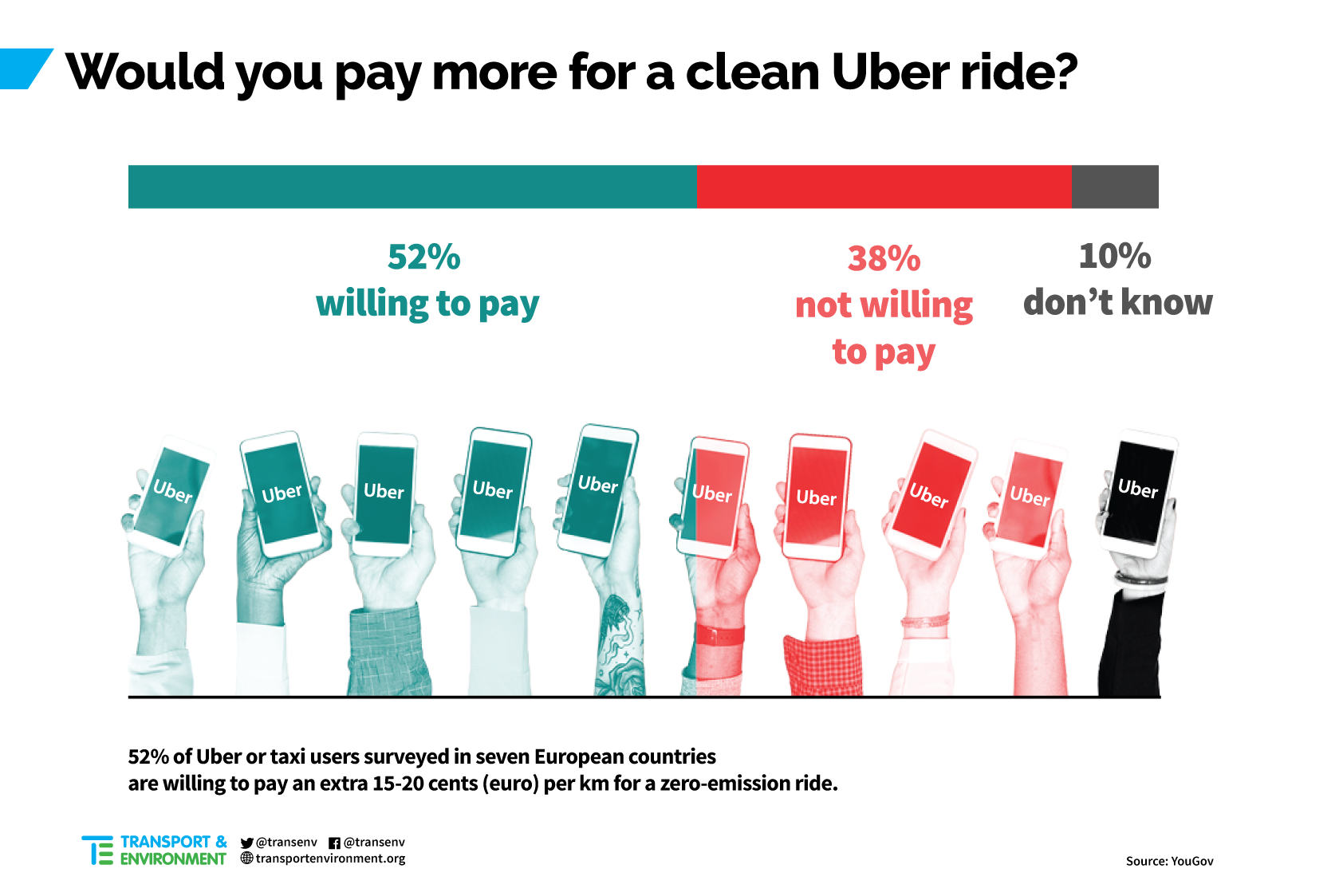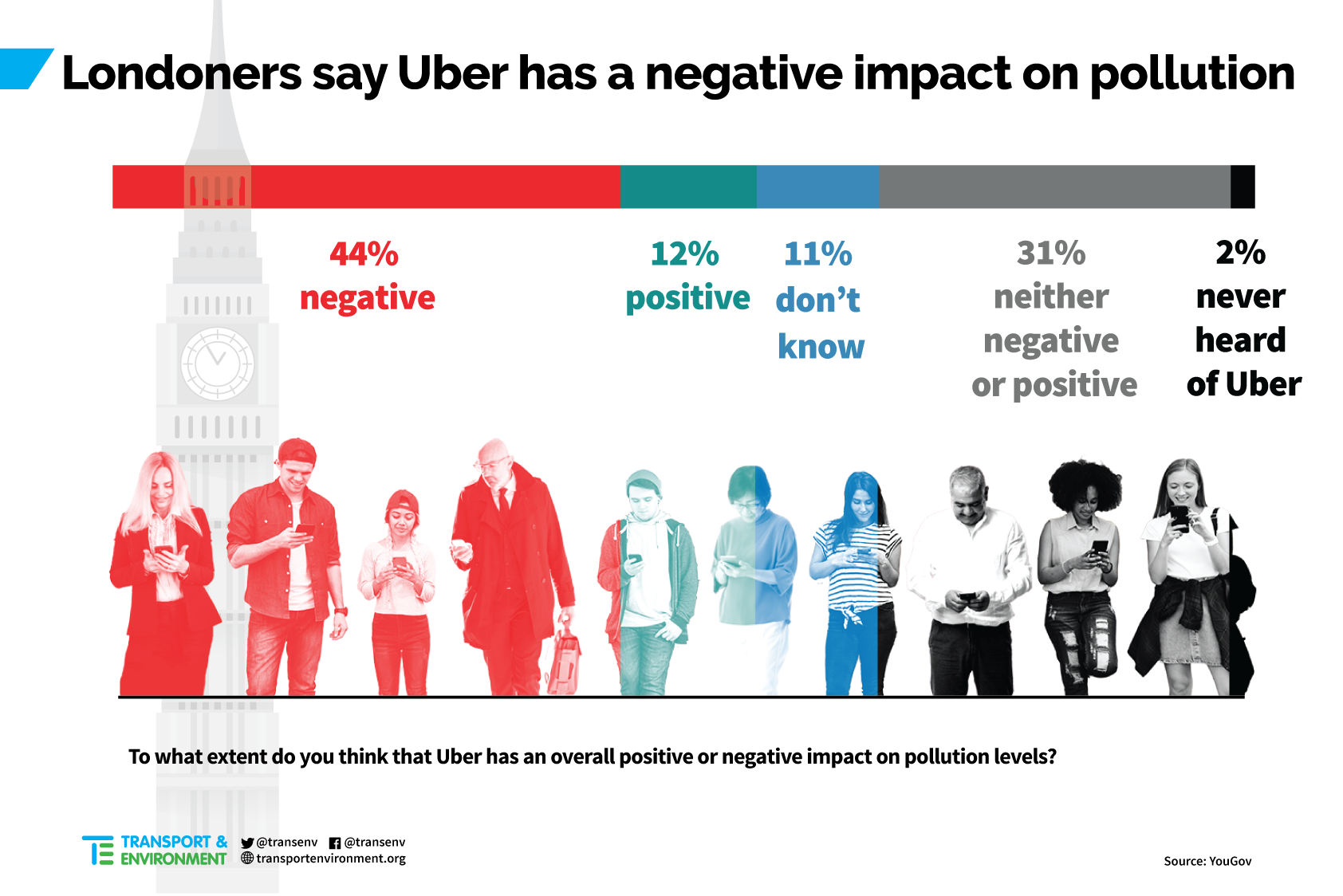
This is especially true with young people who use Uber services more frequently [3]: six out of 10 people (60%) aged 18-24 surveyed are willing to pay more for a clean ride. Uber needs to help its drivers with the upfront cost of switching to electric cars. Electric cars are cheaper to run than fossil fuel cars due to lower fuel, insurance and maintenance costs.
Another key finding of the survey is that people most exposed to Uber, those living in the big metropoles where the corporation has extensive operations, have a more negative perception of the company’s impact on pollution.
This is particularly notable in London and Paris, Uber’s two biggest markets in Europe. Almost half (44%) of Londoners say Uber has a negative impact on pollution overall [4], while only one in eight (12%) think Uber has a positive impact on air quality. Similarly, over a third (34%) of Parisians say Uber impacts negatively on pollution levels in the city [5], compared to a fifth (21%) who think the opposite.
Yoann Le Petit, new mobility expert with Transport & Environment, said: “Uber’s customers are wise to its air pollution and are even willing to chip in for a clean ride. Now Uber must do its fair share for the climate and our health. Thus, the #TrueCostOfUber campaign urges the company to electrify its fleet in its 10 biggest European cities by 2025.”
The latest T&E analysis of the taxi and ride-hailing market estimated that in London [6] and Paris alone, the emissions of Uber taxi services could be as high as half a megatonne of CO2 – 515 kilotonnes of CO2. This is equivalent to adding the CO2 emissions of an extra 250,000 privately owned cars to the road.
Uber is one of the biggest taxi-like services in Europe, with 3.6 million users in London in 2019 and with 2.7 million users in France in 2017. Worryingly, French government data from 2017 show that 90% of the registered private hire vehicles, including those of Uber, were diesel cars.
Paris and Brussels citizens urge their politicians to clean up Uber
The poll shows that 59% of Parisians who take Uber and taxis are willing to pay more for zero-emission rides. Citizens’ platform SumOfUs, Paris air pollution group Respire and Transport & Environment (T&E) are mobilising the Paris population to urge all candidates for the Mayor of Paris to commit to clean up Uber if elected. After two weeks of petitioning, more than 17,000 citizens have signed the petition.
Olivier Blond, President of Respire, said: “With 78% of young people saying they’re ready to pay a little more for zero-emissions cars, Uber has no excuse for not upping its game, abandoning diesel now and switching to 100% clean vehicles.”
According to the poll, 57% of Brussels citizens are willing to pay more for a clean ride. SumOfUs along with Brussels air pollution group Les Chercheurs d’Air and T&E are engaging with Brussels inhabitants to urge the Brussels Region Environment Minister, Alain Maron to only allow zero-emission Uber rides in the capital city. Launched last week, the online petition has already gathered 3,000 signatures.
Pierre Dornier, President of Les Chercheurs d’Air, said: “Air pollution is a health emergency in Brussels. Each Uber car is driving hundreds of kilometers every week, often empty, worsening air pollution and congestion. The company must use zero-emission and shared cars to become part of the solution, not the problem. We urge Minister Alain Maron to commit to tackle this issue.”
The #TrueCostOfUber campaign is active in six countries across the world and includes NGOs such as the Sierra Club, Nabu, Respire, MilieuDefensie, Les Chercheurs d’Air, Bond Beter Leefmilieu and Transport & Environment.
ENDS
Notes to Editors:
[1] 38% of people surveyed said they were not willing to pay more for a clean ride while 10% didn’t know.
[2] All figures, unless otherwise stated, are from YouGov Plc. Total sample size was 12,523 adults from the UK (N=2,204), France (N=2,091), Germany (N=2,135), Spain (N=2,018), Italy (N=2,062), Netherlands (N=1,011) and Belgium (N=1,002). Fieldwork was undertaken between 28th October – 6th November 2019. The survey was carried out online.
[3] The first noticeable result is that younger people have more experience with ride hailing services than older people. Almost one in two of under 35s have ever used Uber (42%), compared to less than one in five people aged 45 and over (17%). By contrast, experience with traditional taxi services is homogeneous across all age categories, with almost two thirds of all people surveyed having ever taken a taxi (64%). This corroborates statistics from the UK department of transport, according to which since 2002, the main users of taxi and PHVs have been those aged 17-29.
[4] 12% of respondents in London think Uber has a positive impact on pollution, while 31% think is neither positive or negative and 11% don’t know.
[5] 21% of respondents in the Paris Region think Uber has a positive impact on pollution, while 28% think it is neither positive or negative and 14% don’t know.
[6] Since Uber’s arrival in London, its biggest European market, taxi and PHV trips have increased by roughly 25% in the capital. This data strongly correlates with a 23% increase in overall CO2 emissions for the taxi and PHV sector in the UK in the same period.



